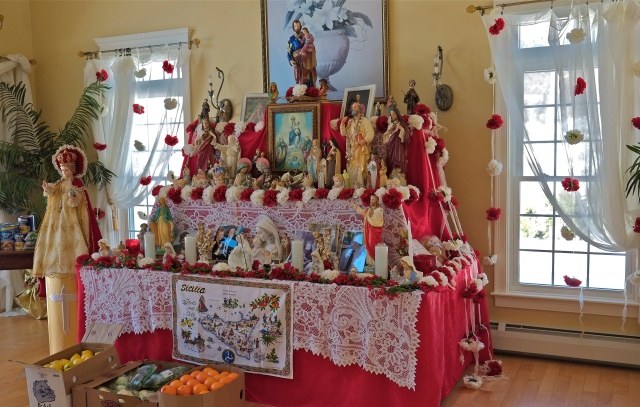March 19 is St. Joseph Feast Day and traditionally falls during the Lenten season and is a day of abstinence, which is why St. Joseph tables and alters are meatless.
If the feast falls on a Sunday other than Palm Sunday. it is observed on the next available day, usually Monday, March 20, unless it is another saints feast day. Since 2008, if St. Joseph's Day falls during Holy Week, it is moved to the closest date possible before March 19, usually the Saturday before Holy Week. This change was announced by the Congregation for Divine Worship in March-April 2006.
St. Joseph is the patron saint of the Catholic Church, carpenters, workers, unborn children, realtors, against doubt and hesitation, and a happy death. Personally, I think he should also be the patron saint of step-parents, foster parents and adoptive parents, for he was one and took in another's Child to raise as his own.
St. Joseph is also the patron saint of many countries, such as: Croatia, Vietnam, Malta, Philippines, United States, Spain, and Italy are just some.
On the Italian island of Sicily, where St. Joseph is regarded as the island's patron saint, and in many Italian-American communities, thanks are given to St. Joseph for helping to prevent a famine on the island during the Middle Ages. The drought was so severe in Sicily that the inhabitants prayed to their patron saint for rain and if St. Joseph answered their prayers the would prepare a large feast in his honor. As it is said, the rains came and the Sicilians prepared a large banquet for St. Joseph. The fava bean is the crop that saved the people of Sicily from starvation and is a traditional part of St. Joseph's Day altars. Giving food to the poor is a traditional part of St. Joseph's Day. In some communities. on St. Joseph's Day, it also traditional to wear red and eat the Neapolitan pastry, Zeppole.
In Italy St. Joseph's Day is also Father's Day. Good day to have I think.
In the U.s. In Louisiana, especially New Orleans, which was a major port of entry for Sicilian immigrants in the late 19th century, St. Joseph's Day is a city-wide event and not just for those of Sicilian background. There are both public and private St. Joseph altars. For those that wish to pay homage the altars are usually open to visitors. After the altar is taken down the food is usually given to local charities.
There are also parades held to honor St. Joseph and the Sicilian population in New Orleans, which is akin to those of St. Patrick's Day and Mardi Gras. On this day, some Mardi Gras Indians stage their last procession of the season on the Sunday nearest to St. Joseph's Day. This is known as "Super Sunday" and afterwards their costumes are dismantled.
 |
| New Orleans St. Joseph's Day 2014 courtesy of The Times-Picayune |




No comments:
Post a Comment